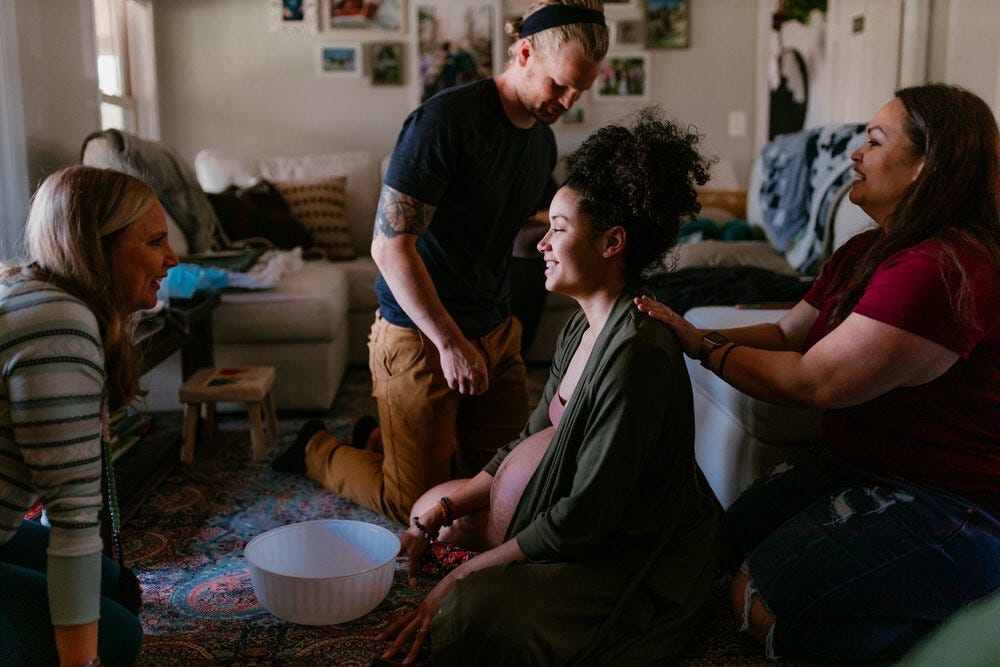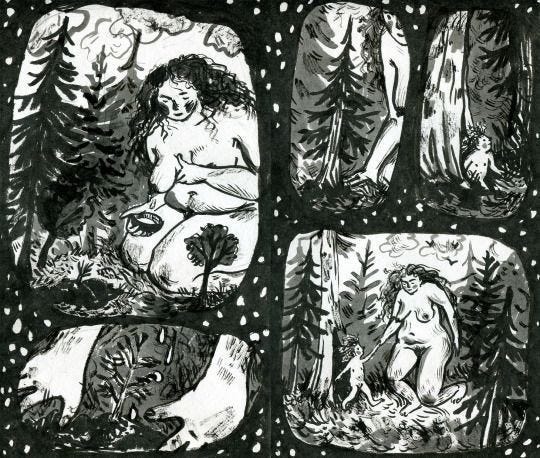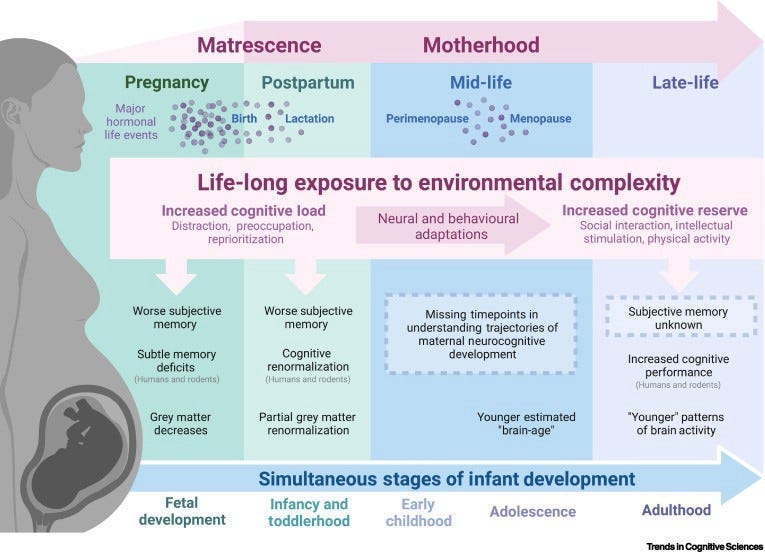
Pregnancy discomforts and birth injuries, postpartum depression, identity crisis, relationship struggles and social isolation — at times learning about motherhood feels pretty daunting. How come that in our culture we don’t seem to have better ways to support this transition? Looking for answers took me not only into my own body but on a path to a small revolution.
I found out about the new life that is on its way behind a bush, peeing on a stick in a Swedish fjord. We told the ocean. In Sweden pregnancy is seen as a normal part of life. If you don’t have any complications, you barely see a doctor during your pregnancy, all check-ups and postpartum appointments are done by midwives and doctors are only called in on the birth if needed.
Birth. It’s a miracle. And there’s blood and slime and shit. We kind of know that. But what nobody really tells you about before you get there, is the full impact of the transition to motherhood and how unprepared Western society is to deal with a big part of it. Birth and motherhood are supposed to be natural things, but in Western cultures, we’ve lost a lot of the connection to what might have been natural for our ancestors. Here, preparing for the process often means medical support, books and courses full of knowledge, offers for physical exercise, lists of things to buy, guides on how to “bounce back” and different forms of help from our family and friends.

Trying to wrap my head around what I’ve gotten myself into, I’ve spoken to friends and colleagues that went before me and who are openly sharing their experiences. And sometimes when listening to them, my heart is breaking. Did these new parents, and particularly women really have to feel that isolated, inadequate and broken? I feel grief and disbelief that in our culture, there seems to be no better way to prepare for and go through this time in our lives. Somewhere between colonisation, Christianisation, the industrial revolution, the rise of capitalism and our separation from each other and nature as a whole, we seem to have lost track of ways to hold this transition with deep care, respect and dignity. For myself and others, I want better than that.
Embodied realities
I am in awe of what my body is capable of. It is creating an environment capable of growing a new human while I work, dance, chat with friends, eat and sleep. A small sea is growing in my belly to make a home for this water creature. My muscles, tendons, organs and even bones are moving to make space for this new life. I grew an entirely new organ, the placenta that acts as a firewall and life support system. My heart pumps double the amount of blood to keep us both well nourished. And when the little human is born my body will make food for it, containing protection spells in the form of antibodies, and the right amount of nutrients and hormones, depending on the temperature and time of day. It’s magic.
And. To be honest, a lot of the sensations around pregnancy are uncomfortable, restrictive or outright painful. I’ve never been as tired as in the first trimester. And if you think of needing a few extra naps, you’re far off. At times I felt completely out of touch with who I am. I was so exhausted that I couldn’t think straight, slept through work meetings and lacked the energy to imagine things to enjoy. On some days I felt sick, though I didn’t have to throw up a lot. Now often I feel winded after a short flight of stairs, my back feels the extra weight and it’s becoming increasingly difficult to sleep. And the hormones would sometimes send me from peaceful and full of love to anxious, shaky or crumbling with tears. You might remember that part from puberty. During adolescence erratic behaviour is kind of expected, but it’s challenging when you’re supposed to be (and expect yourself to be) a fairly grounded, fairly smart, at times fairly professional adult. Some women feel much better than I do, and some much worse.

As losing your baby is a fairly common possibility during the first trimester, many of us don’t talk about their early pregnancy, especially not at work. I am a freelancer and lucky to be working in teams where it feels safe to show up authentically. I wanted my colleagues to know what was happening for me, what I could commit to and where I needed extra flexibility. And, thinking of the possibility of an early end to my pregnancy, I wanted to have laid the ground for them to understand and support my grief. Thinking of women in regular jobs who have to keep delivering as if nothing was happening, I feel the heaviness of this taboo.
At times learning about parenthood, and motherhood specifically, feels like opening a Pandora’s box. From all the kinds of pregnancy symptoms (haemorrhoids are a real thing!) to challenging mental health, changing roles and relationships, stereotypes and the pressure to return to working and looking like your old self— becoming a mother quickly seems a path loaded with challenges.
Collective trouble
As someone who supports the growth of regenerative cultures in the communities I am working with and society as a whole, I understand these challenges not simply as individual problems but as systemic issues. After all, we all enter this world through wombs and the way we spend these early days and the wellbeing of our caregivers have a huge impact on our later lives. Think of birth and attachment traumas, both of mothers and children or the prevalence of postpartum depression and anxiety — what a difference would it make if we all went through this event full of trust and ease.

Western culture seems to lack language and tools for understanding and supporting this time of life as a connected whole instead of a collection of compartmentalised issues. Reasons for this might be the patriarchal conditioning that has erased women’s experiences and wisdom for centuries and the development of science and medicine as distinct disciplines, looking at parts of the world as separable and controllable.
So, what might we be missing?
Giving words to the in-between: matresence
I first heard the term “matrecence” on an episode of the Menstruality Podcast with Amy Taylor Kabbaz. It was coined by Dana Raphael to make up for the lack of vocabulary for the process of becoming a mother. Like adolescence, it describes profound changes on the biological, psychological, social, political and spiritual level. It covers the period from preconception to the time after birth and beyond. People like Amy Taylor Kabbaz, Aurélie Athan or Alexandra Sachs are reviving and promoting the concept of matresence to give voice to women’s experiences.
Neuroscience for example, is only now starting to catch up with the profound changes motherhood creates in our brains. Like in puberty, a huge rewiring is taking place. This accounts for “baby brain” the forgetfulness women describe in pregnancy but also increased capacity for reading nonverbal clues and spotting danger. While motherhood improves memory, resilience, executive function and overall performance in the long run, initially it comes with profound challenges of increased cognitive load, challenging mental health, poor sleep and low physical resources.
“I believe matrescence is more biologically significant than adolescence. It’s a pretty big call but if we have a look at the brain changes, there’s more neurogenesis occurring during pregnancy than there is during an entire adolescent time.” — Dr. Oscar Serrallach
It felt like a huge relief to see that there is language to communicate and validate what is taking place for me and others, and to know that there is at least some guidance on how to navigate it all. When I can allow myself to acknowledge what’s happening and give up on old expectations of productivity, I feel much more peaceful, present and connected. With a better understanding of matresence, the care we extend to mothers as communities and institutions would look much different.
Looking at birth as a rite of passage
The mothers I’ve spoken with shared stories of love, growth and wonder, but also how overwhelmed they felt, how patronising or dismissive medical staff and officials were treating them at times, how lonely life can get when you can’t socialise as you used to, how difficult it is to feel pressure to recover to their “old self” and to find a new self in the middle of it.
Traditionally, motherhood was often framed as something instinctual and natural for women. This view is no longer unchallenged. While feminism has questioned motherhood as the female way to fulfilment and highlighted its entanglement with unequal power structures, the medical field connected it to notions of ‘risk’ and the postpartum period with psychopathology and dysfunction. There is huge value in both perspectives, but the discrepancy between our societal narratives and the lived experience of mothers, seems to not only create a lot of unnecessary distress but also to rob us of the real growth potential of this life event.

While I am grateful for the medical support that is available, the high numbers of not medically necessary c-sections and other interventions in Western countries and how birth can become orchestrated as an effective event, give me the feeling we’re avoiding something we don’t know how to navigate. Apart from not being in tune with our mammalian bodies and interrupting the natural flow of birth, thinking of the event as primarily being a sort of medical emergency that needs to be mitigated, takes away the opportunity to see it as a sacred moment of transition. How would it look like if we could more consciously be with the liminal experience of birthing, truly feel this life/death/life moment and connect with our inner strengths and deeper truths?
I loved reading the study “Motherhood as Opportunity to Learn Spiritual Values: Experiences and Insights of New Mothers”, in which Aurelie Athan and Lisa Miller look at motherhood as equivalent to more commonly accepted activities of spiritual development. Childbirth and pregnancy regularly seem to produce transcendental or metaphysical experiences that create shifts in awareness. They write that mothers need “rites of passage or alternative interpretive frameworks to illuminate the presence of their spiritual work” to support them in reframing their experience as “an empowered choice to wilfully embark on a spiritual journey”. Throughout earth’s history human communities have been supporting each other with rituals through the transitions of different life stages. Rites of passage give guidance and meaning through the vulnerable time of change, help to connect us to our deeper resources, support us in letting go of the old and integrating it all in a way that contributes to the overall health of the self and the community. And why would you want to “bounce back” from that?

So far, I’ve come across some amazing midwives and doulas who are speaking about conscious birth and supporting parents on their journey, became familiar with hypnobirthing and enjoyed practicing prenatal yoga. I’ve also found a few (quite expensive) invitations for retreats or online courses and learned that “Blessingway Ceremonies” are starting to substitute baby showers. Still, while these offers are a great start, they seem far away from providing integrated spiritual holding or from being normalised and widely accessible. In the absence of elders or cultural patterns, the responsibility to find them often lies with the individual.
Mothering a culture that puts life at the centre
Society hugely impacts our experience as mothers — the role models and gender roles we grow up with, the taboos and expectations, the information that is passed on, the support we receive throughout the journey, the birth place options available to us, the impact on our finances, careers and social life. What if how we become mothers in turn can hugely impact society?

In their study Aurelie Athan and Lisa Miller looked at motherhood in relation to themes of spiritual growth that appear across the biggest world religions. They include unconditional love and interconnectedness, transcending one’s ego, empathy and compassion, mindfulness and presence, discovery of meaning and purpose and a renewed faith or interest in the sacred. They found that mothers experienced remarkable shifts in all those fields, even though they often lacked vocabulary to articulate it. It seems, becoming a mother can be one of the spiritual paths with the potential to create the inner shifts our world needs so desperately: a move away from narcissistic self-centeredness and ideas of individual success towards empathy and a lived interconnection with all of life.
“The theoretical ground of maternal development demands re-invention with each generation, as MacMahon (1995) stated, “motherhood has the potential to challenge not only the political order but the deeper cultural images of human nature and the links between society and nature on which the social and political order rests” (p.27).” — Athan and Miller
Athan and Miller describe the behavioural aspects of motherhood as being non-gendered and universally available to anyone who engages in the process of being the primary caretaker of a child. Mothering therefore is a practice that is available to all genders, and in its spiritual dimension an orientation towards all of life that can help shift humanity out of its current predicaments of the climate catastrophe and increasing inequality. Miki Kashtan for example, is using the term “re-mothering” after Genevieve Vaughan to describe the turning towards others’ needs and to the whole, which also includes the self. To her, re-mothering our world means uncoupling GIVING from RECEIVING and moving towards active interdependence.
Unknowns
As I am writing this, I am listening into my body for the first signs of labor to start. I am still very much in the middle of it and I don’t know how I’ll arrive on the other side. But so far, I’ve learned that becoming a mother isn’t just either bliss or a shit-show. Not only can it be a path to personal growth, but a revolutionary practice in service of all life on this planet as well as the future generations. I want to keep imagining and working towards a world where life in all its dimensions is more important than profit.
I’ll end this one with a quote by Rilke that a dear friend recently shared with me:
I beg you, to have patience with everything unresolved in your heart and to try to love the questions themselves as if they were locked rooms or books written in a very foreign language. Don’t search for the answers, which could not be given to you now, because you would not be able to live them. And the point is to live everything. Live the questions now. Perhaps then, someday far in the future, you will gradually, without even noticing it, live your way into the answer. — Rainer Maria Rilke
If this stirs some thoughts or you have more resources on the topic, please share them by commenting on this article or reaching out to theresafend@gmail.com!
***
Resources
Matresence with Amy Taylor Kabbaz on the Menstruality Podcast
Aurelie Athan’s website on Matresence
TED Talk on Matrescence with Alexandra Sachs
Matrescence: Lifetime impact of motherhood on cognition and the brain
Birth as Rite of passage with Penny Simkin
Doula talk with Terri Nash & Leslie Stager — Birth as a Rite of Passage






